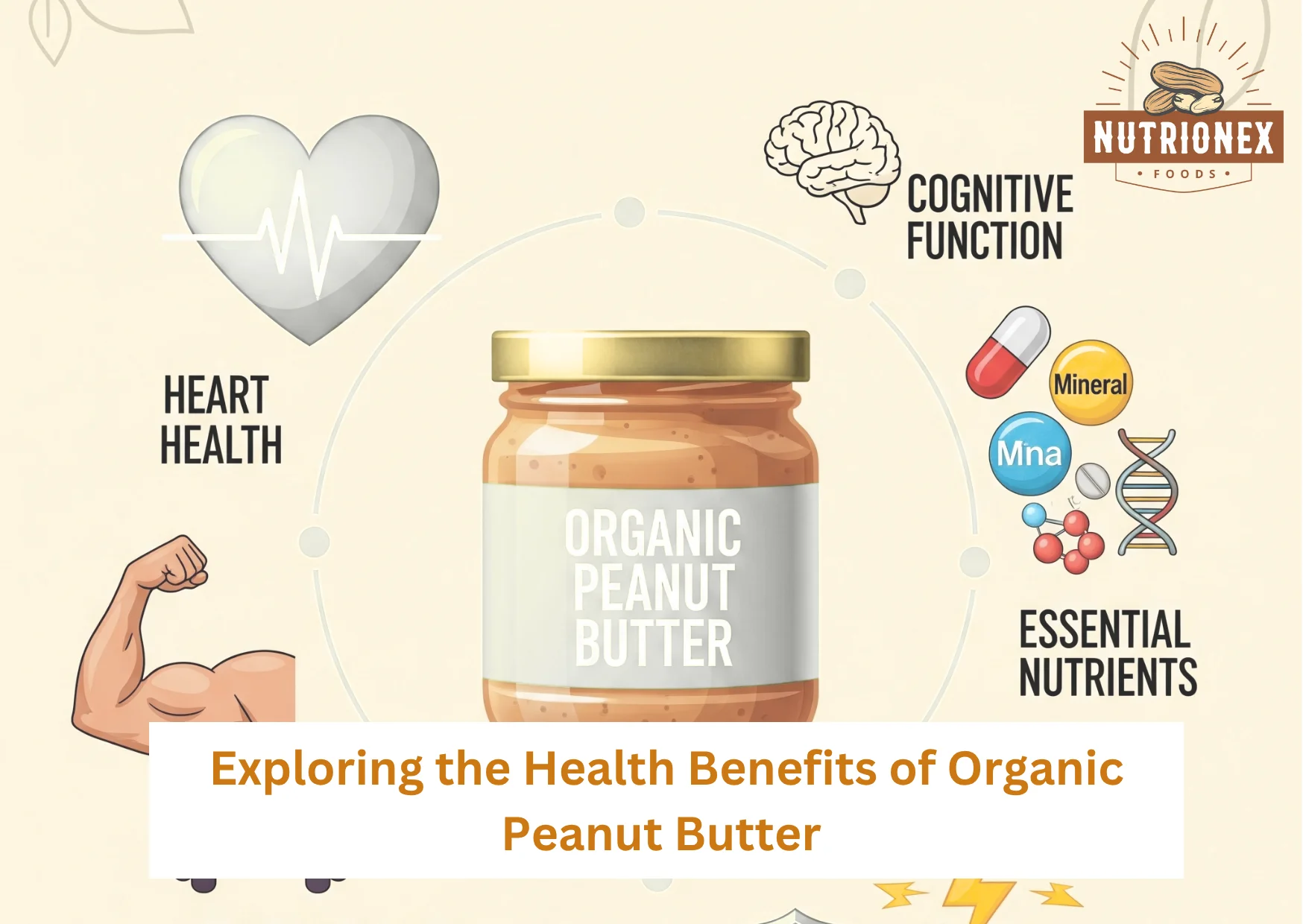
Exploring The Health Benefits Of Organic Peanut Butter
The benefits of organic peanut butter go way beyond its great flavor and provide a nutritious food that aids in general well-being when used as part of a balanced diet. To know more about the health benefits of organic peanut butter, it is essential to study its nutritional profile and compare it with other less organic ones and moreover, know how its exclusive properties can also bring about various health and well-being potentials. Many consumers looking for the best natural organic peanut butter often prioritize quality ingredients and sustainable farming.
What Makes Organic Peanut Butter Different
Organic peanut butter is made with organic peanuts, which are not grown with the help of synthetic pesticides, herbicides, fertilizers, or GMOs. By this means of production, there is less likelihood of exposure to potentially toxic chemicals, and it is quite likely to produce a higher nutrient density and be more environmentally friendly than the traditional products of peanut butter. This is particularly true for organic PB powder which retains much of the same health integrity in a convenient powdered format.
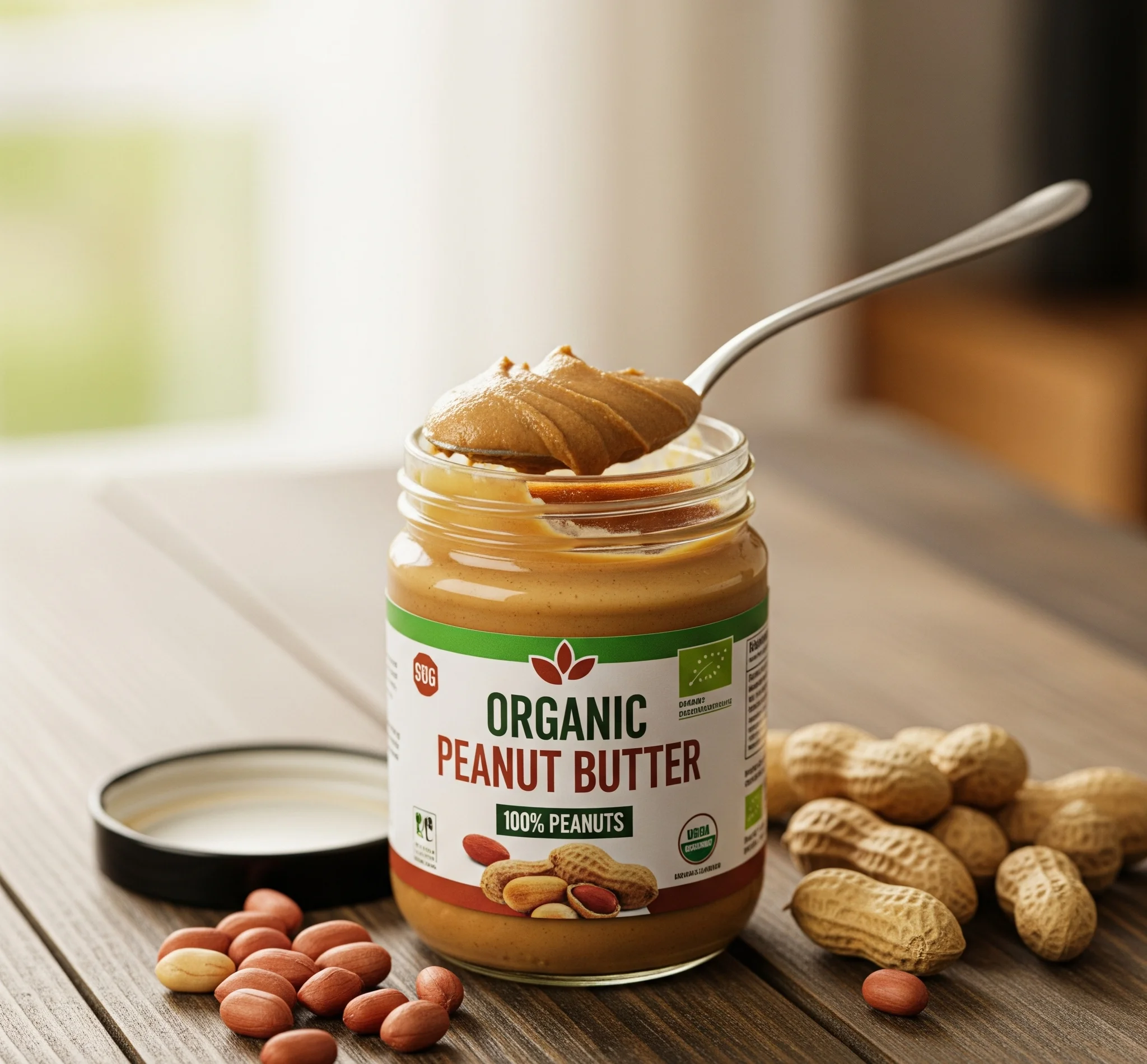
The organic certification is carried out in a way that the organic peanuts are grown through natural means of farming, which enhances soil health, biodiversity, and ecological balance. Such agricultural techniques have a propensity to produce peanuts with improved nutritional quality, such as increased content of antioxidants and healthy compounds that add to the beneficial effects of the end-product.
Minimum processing criterion of organic peanut butter usually indicates fewer additives, preservatives and artificial units. The majority of their organic PB types only have peanuts and salt, thus enabling their consumers to reap the full nutritional value without having to be subjected to unwarranted chemicals and other sugars that may interfere with the nutritional value.
Quality organic peanut butter does not contain trans fats, as there are no hydrogenated oils detected. Trans-fats are linked to risks of cardiovascular diseases and inflammation. This clean ingredient status is what gives organic nut butter a health advantage to those who want to get the best from the food that they eat.
Comprehensive Nutritional Profile
Nutrition in organic peanut butter is an impressive offering of the fundamental nutrients that serve many functions of health and wellness. It would be a healthy two-tablespoon portion of about 190 calories, 16 grams of good fat, 8 grams of protein, 6 grams of carbs, and 3 grams of fiber, with a balanced set of macros.
Organic peanut butter has all the essential amino acids that make up protein content, but it is not a complete protein. The plant protein is of high grade, which benefits muscle building, tissue healing, as well as metabolism, together with long-lasting energy that ensures normal sugar levels in the body during the day. Even pure peanut butter made organically maintains this high nutritional quality.
The healthy fats consist mainly of an amalgamation of monounsaturated and polyunsaturated fats, with the monounsaturated fat having an approximate ratio of 50 percent in the total amount of fats. Those beneficial fats are (1) beneficial to cardiovascular health, (2) reduce inflammation, and (3) help in the absorption of fat-soluble vitamins.
It is also high in micronutrients such as niacin (vitamin B3), vitamin E, magnesium, phosphorus, zinc and folate. These are very important to energy metabolism, the immune system, the health of our bones, as well as cellular repair processes all over the body.
Flavonoids, resveratrol, and phenolic acids: Antioxidant compounds found in food, like polyphenols such as flavonoids, resveratrol, and phenolic acids, protect the cell against oxidative stress and inflammation. Organic peanuts usually have a higher natural content of these healthy compounds than do conventional ones.
Heart Health and Cardiovascular Benefits
The organic heart-healthy peanut butter has a high cardiovascular nutrition value due to the unique blend of heart-healthy fats, fiber and bioactive substances. It is reported that regular intake as a part of a well-balanced diet has shown a positive change in cardiovascular risk factors and a decrease in the number of heart diseases.
The monounsaturated fats that the organic peanut butter contains aid in lowering the levels of LDL (bad) cholesterol, leaving the levels of HDL (good) cholesterol untouched or increasing them instead. This positive effect on the cholesterol patterns helps to improve the condition of the arteries and minimize the chances of atherosclerosis.
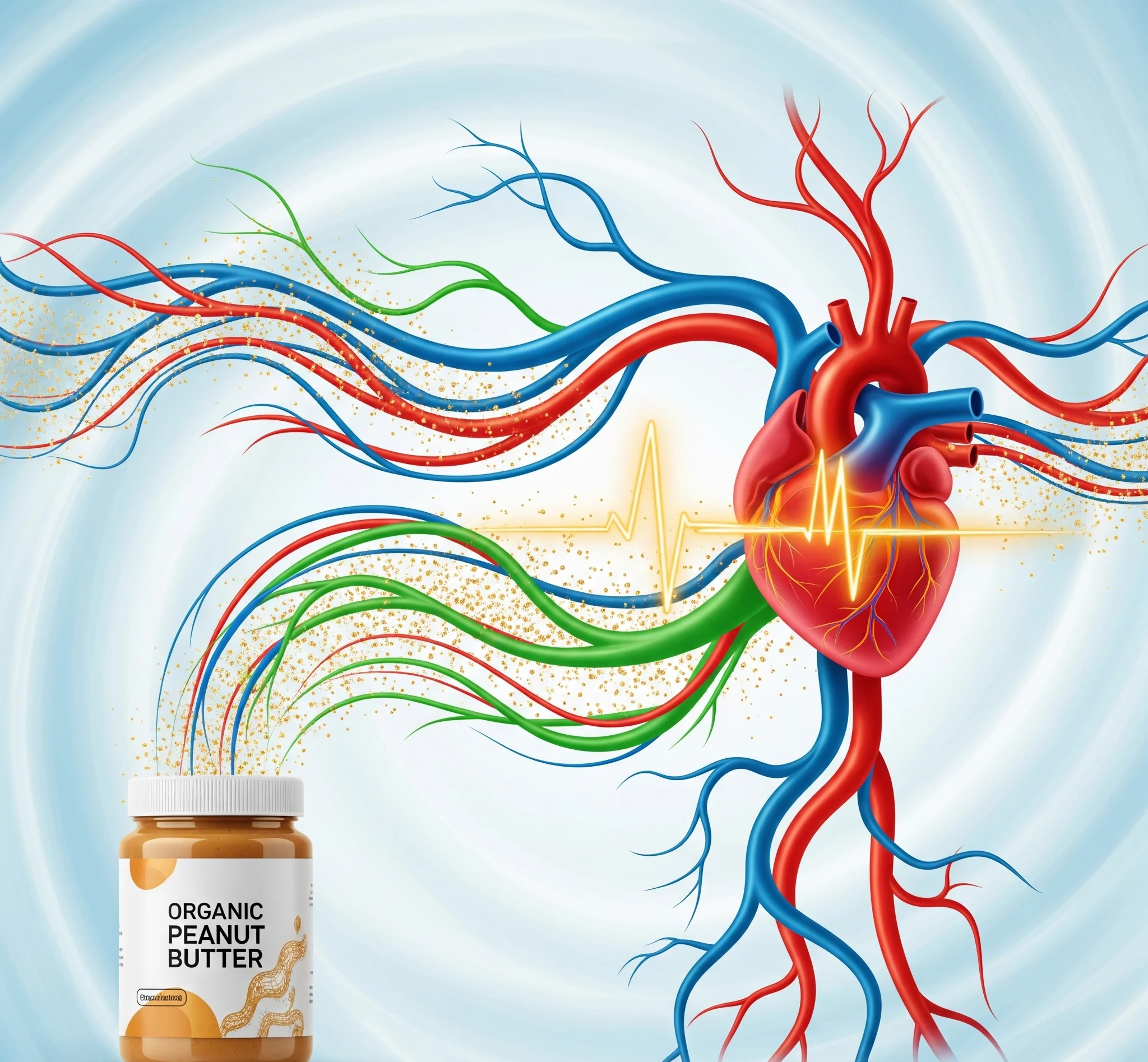
Blood pressure is naturally managed in regard to magnesium to help the blood vessels relax, function properly. There is a connection between sufficient magnesium levels and a lower likelihood of being afflicted with hypertension, as well as an improved overall objective of cardiovascular health.
Their antioxidant nature would assist in preventing oxidative damage to blood vessels and also decrease inflammatory reactions that predispose one to suffer cardiovascular diseases. It is even cardioprotective due to the resveratrol content that is akin to red wine.
In clinical studies, it has been shown that there is a 20-30 percent decrease in coronary heart disease-related risk with the consumption of nuts and nut butter on a regular basis. Synergistic effects of beneficial fat, protein, fiber, and micronutrients have a broad cardiovascular supportive benefit.
Weight Management and Metabolic Benefits
Organic peanut butter and weight management may be perceived to be opposites at first since the content you find in bulk organic peanut butter is a high-density source of possible calories, which, even when taken in moderation, aids healthy weight maintenance and can even help in reducing weight when used as part of a balanced eating habit.
The appetite control and lower total spillage due to satiety development via the protein/healthful fat contingent of organic creamy peanut butter can be used to regulate appetite, resulting in fewer total calories consumed. The macronutrient combination will stimulate some hormonal messages to make a person feel full and reduce their desire to consume less nutritious food.
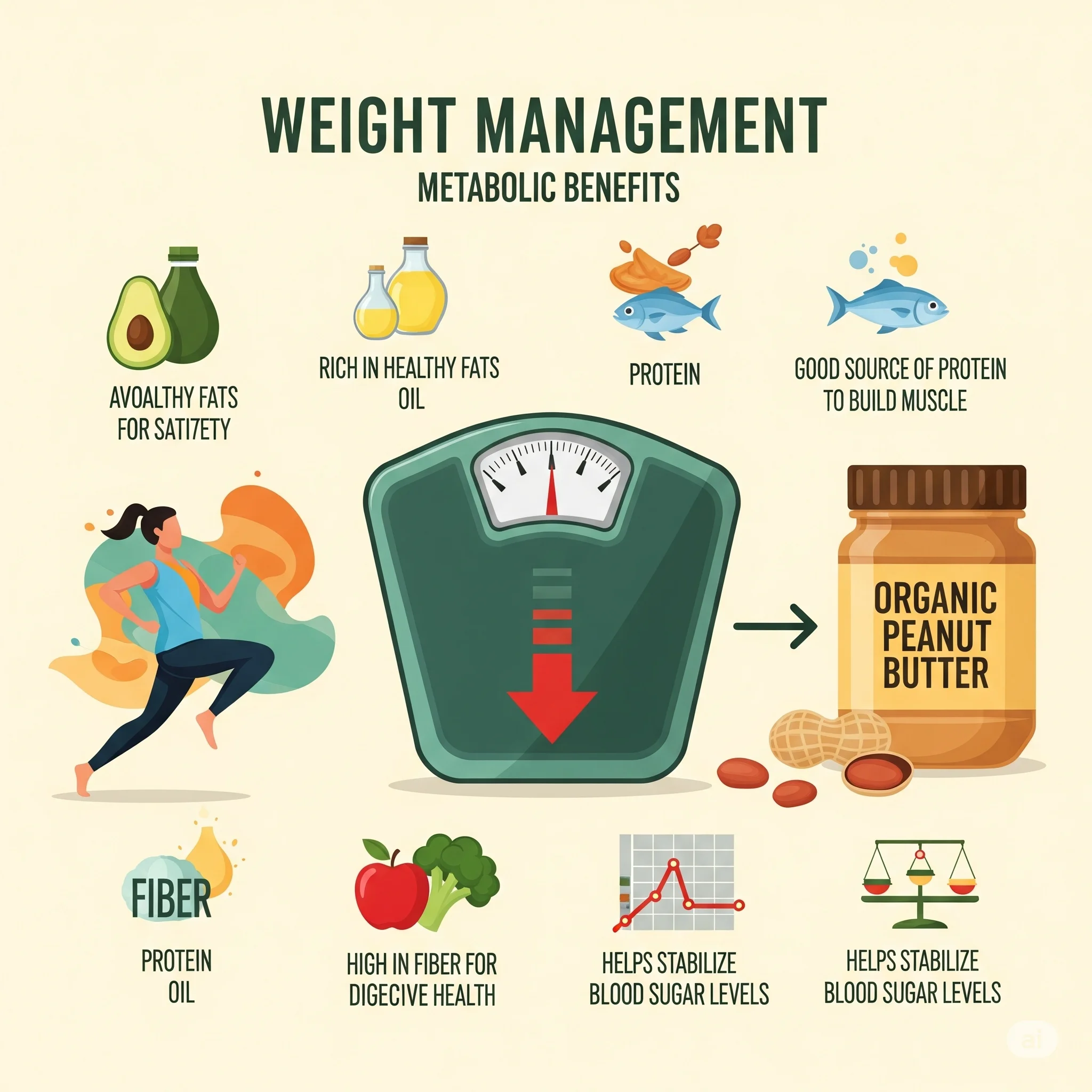
The thermic effect of protein supplies metabolic rate support because protein has to be processed with greater energy expenditure than carbohydrates or fats. This increment of energy utilization plays a role in the enhancement of the overall metabolism and better results of weight management.
Stable blood sugar is due to the balanced combination of macronutrients that reduce the speed at which carbohydrates are absorbed and the resultant sudden increase in the level of glucose. The stability assists in the maintenance of regular energy levels, and during meals, one is less hungry.
Studies on a long-term basis have shown that individuals who actively use organic organic pb powder are more likely to have lower body weights and less exposure to gaining weight and increasing the weight of body to a larger extent, notwithstanding that the food is highly caloric.
Brain Health and Cognitive Function
Brain benefits of organic peanut butter can be explained by the fact that it is rich in nutrients that can help maximize neurological activity and cognitive functions. A combination of healthy fats, protein, and certain vitamins makes up a perfect nutritional balance that supports the health of the brain.
Vitamin B3 (niacin) is vital in the neurological processes in the brain. Niacin has properties that promote or support cognitive functions, memory, and prevent or delay signs of neurodegenerative disorders and cognitive impairments of aging.
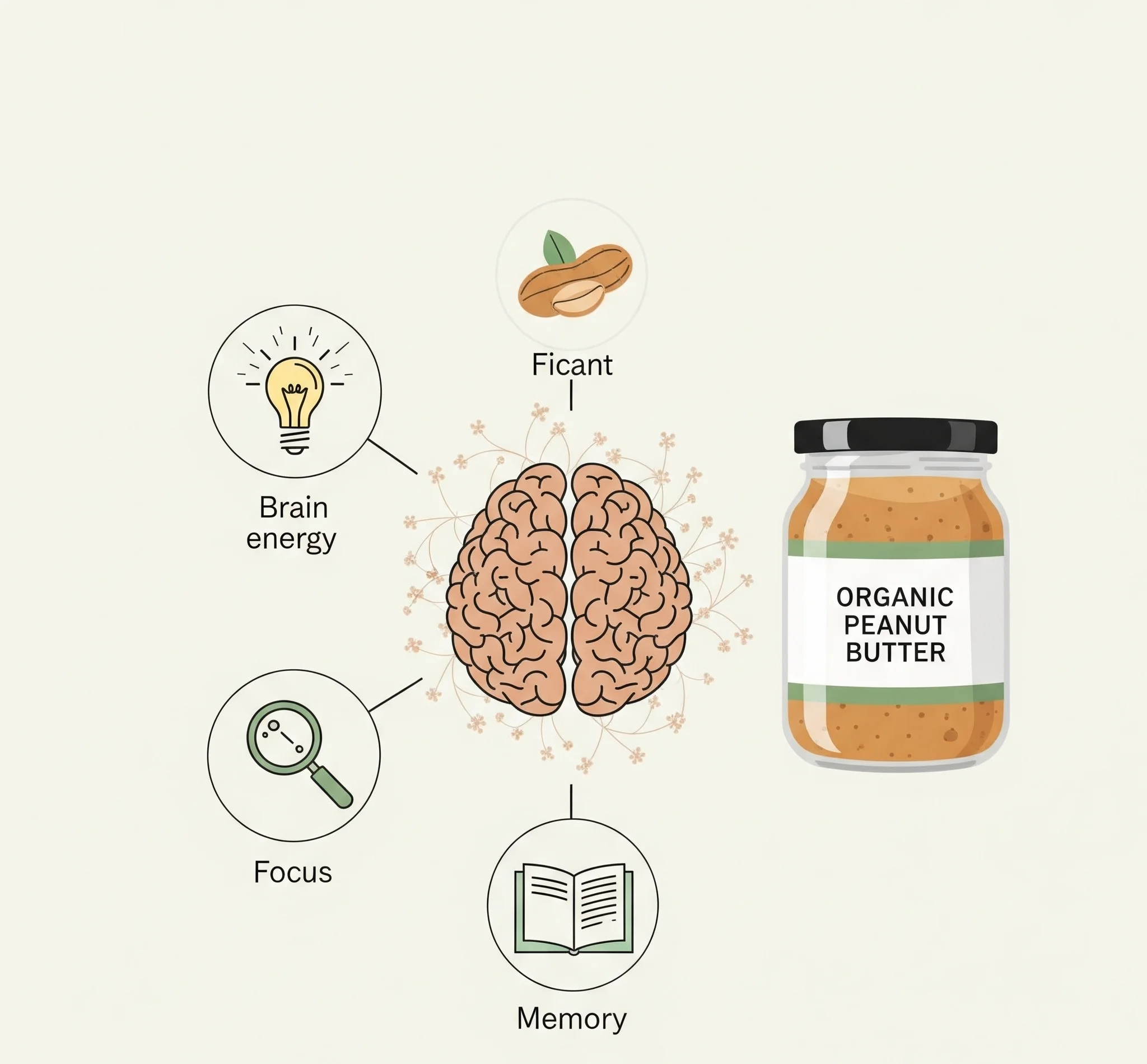
The role that vitamin E plays is that of a strong antioxidant in safeguarding brain cells against oxidative damage. This vitamin of the fat-soluble type is especially relevant in the preservation of the integrity of the neuro-membranes in the neuron and the health of the brain as a whole, as individuals grow older.
Best fats have the building blocks of brain cell walls and help the brain to make neurotransmitters that control mood, memory and thinking ability. Organic peanut butter contains fats that are monounsaturated and are especially good for the health of the brain.
Resveratrol levels can be neuroprotective in ways that other food sources with high levels of resveratrol show. It is thought that this compound can contribute to better cognitive activities and decrease the risk of neurodegenerative disorders.
Muscle Building and Exercise Performance
Organic peanut butter contains superior plant protein and other essential nutrients that favor muscle building, recovery and athletic performance when taken together with proper exercise regimes.
To be of muscular quality, a protein must contain all of the necessary amino acids in order to produce muscle protein, but when paired with complementary proteins during the day, these can be used to help ensure ideal profiles of amino acids required during muscle growth to repair.
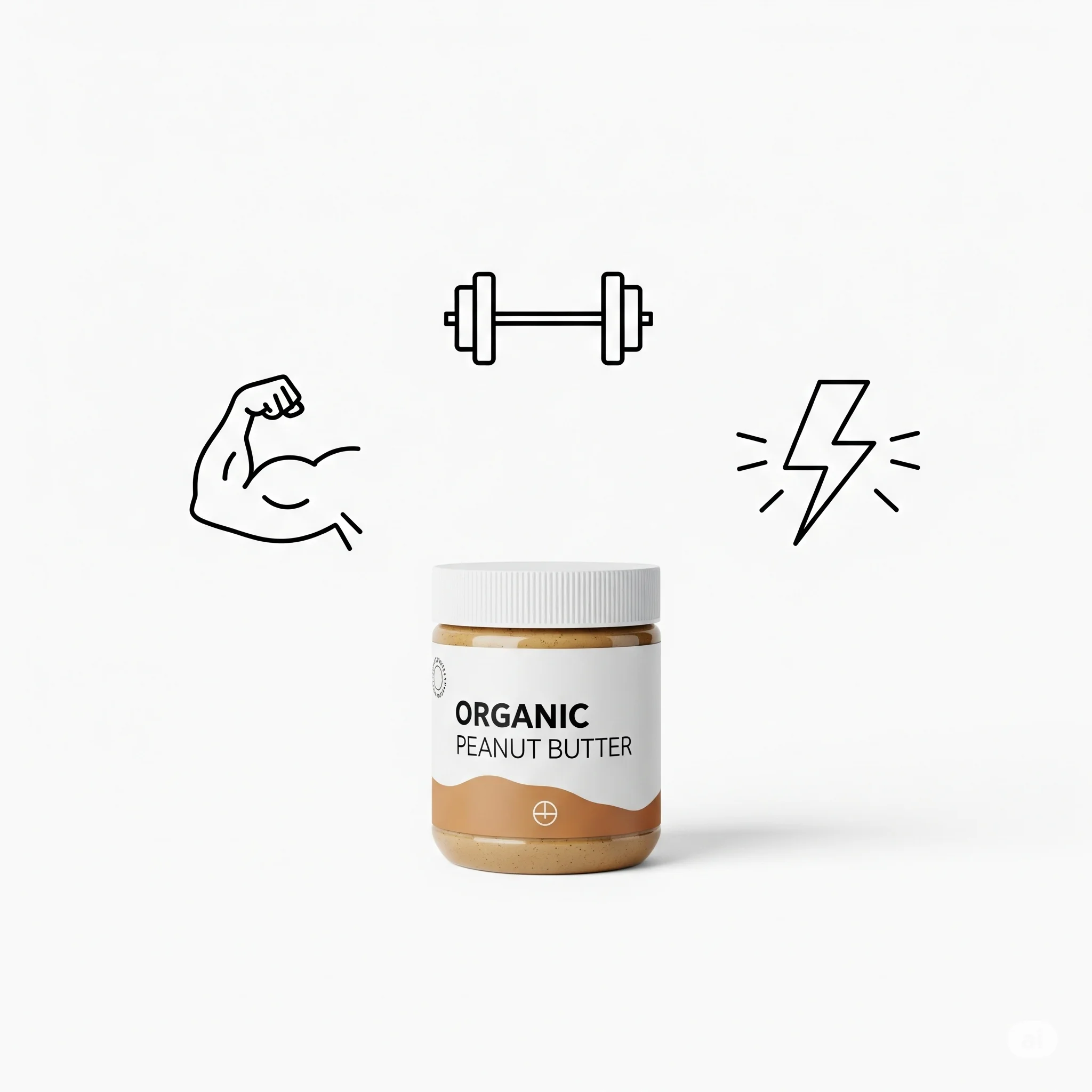
High-energy-density organic powder peanut butter serves as an efficient source of pre-workout as it gives prolonged energy during long training periods and also helps in optimum performance and endurance.
The combination of protein repair of the muscles and carbohydrates to replace the glycogen serves as a recovery support. The anti-inflammatory features can aid in lessening pain and muscle harm that are brought about by working out, and lead to quicker recovery.
The convenience factor leads to organic peanut butter being a convenient and portable source of protein to athletes and active people, as they require convenient sources of nutrition to complement recovery and training requirements.
Bone Health and Mineral Support
One of the most striking advantages of bone health presented in organic creamy peanut butter is its remarkable mineral composition needed to sustain strong bones, in a perfect cross-section of one functioning throughout the entire life. The phosphorus, magnesium, and other trace elements are also beneficial to maximum bone density and structure.
Phosphorus levels are also synergistic with calcium in the construction and preservation of bone and teeth. The consumption of adequate phosphorus helps maintain flat bones through the structural integrity and mineralization of bones until death.
The role of magnesium in bone health does not rely only on mineralization because magnesium is necessary to activate vitamin D and use calcium regularly. A lack of magnesium may hamper the formation of bones and increase the risk of getting a fracture.
The roles of protein in bone health also involve the supply of amino acids that are required in the process of collagen production and the formation of bone matrix. The sufficient supply of protein needed in the body is critical to the strength of bones and the prevention of ageing bone weakness.
Trace minerals, such as zinc and manganese, play several roles in the metabolism of bone, including collagen production, bone cell production and the mineralization of the bones.
Antioxidant Protection and Anti-Inflammatory Effects
Organic peanut butter antioxidants offer protection of the cell against the damage caused by free radicals and perpetual inflammation, which causes a number of diseases and health disorders that arise during aging.
The resveratrol content has comparable antioxidant advantages to red wine and grapes, such as protection against cardiovascular diseases, anti-inflammatory reactions, and even anti-aging advantages.
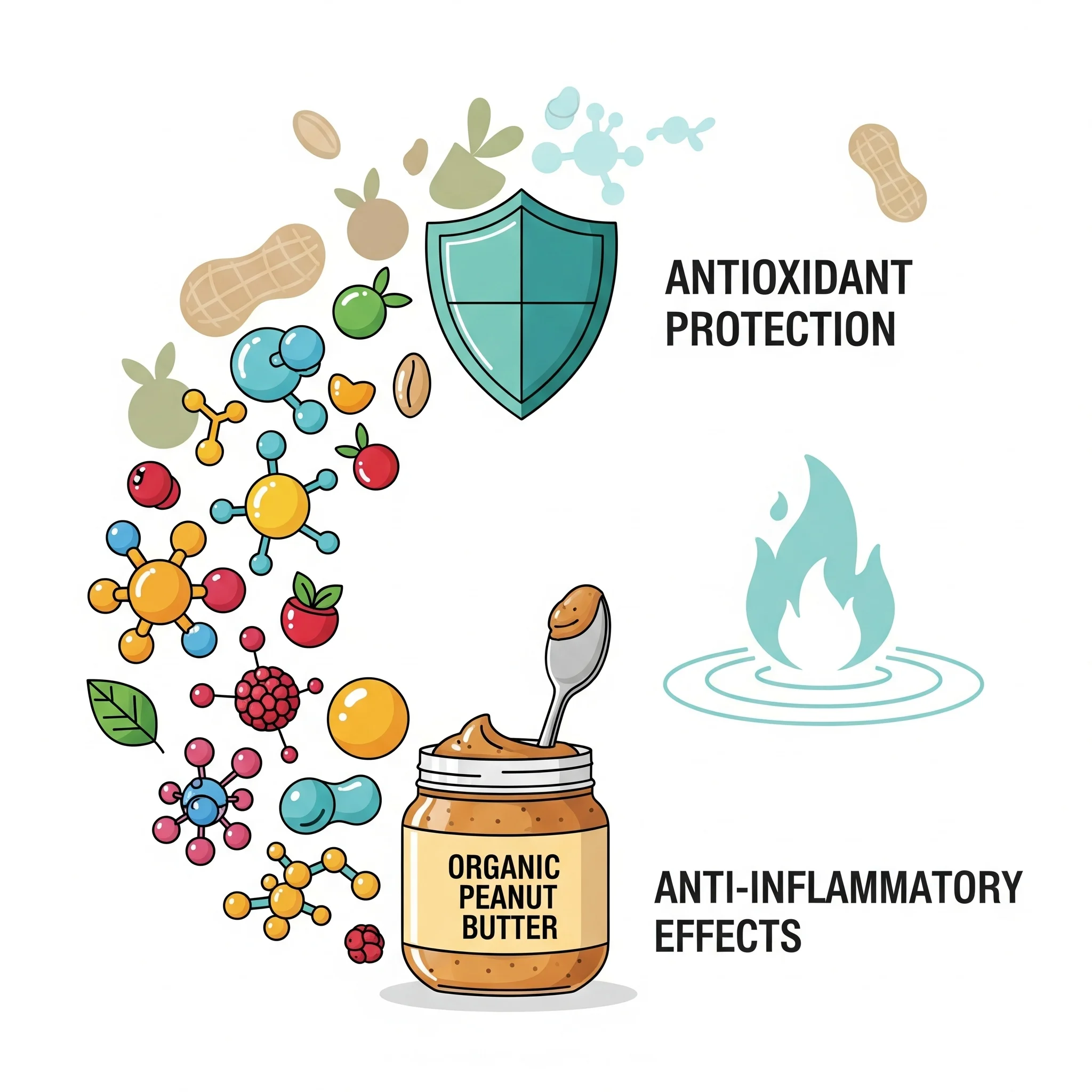
Vitamin E is a major fat-soluble antioxidant that maintains cell membranes against oxidation. Such shielding especially helps in preserving the integrity and cellular activity of the body.
The organic peanuts also contain phenolic compounds, which confer more antioxidant protection as well as anti-inflammatory actions that could minimize the risk and help prevent chronic diseases and also promote health and longevity.
The steady-state inflammation decreases due to the frequent use of antioxidant-rich foodstuffs such as organic pb that can be used to prevent or cure inflammation-related disorders such as cardiovascular disease, diabetes and cancer.
Digestive Health and Gut Support
Peanut butter made of organically grown peanuts has certain digestive advantages, such as the presence of fiber and having prebiotic effects that promote the balance of the gut microbiome and the healthy functioning of the digestive system.
The presence of fiber facilitates healthy bowel movement, fosters the growth of good bacteria in the gut, and enables the upkeep of healthy cholesterol levels. These two types of fiber (soluble and insoluble) give an overall digestive support.
Some of the compounds found in peanuts could have a prebiotic effect and contribute to feeding positive gut bacteria, thus maintaining microbiome diversity and preserving digestive health.
The fat-soluble vitamins (A, D, E, K) are absorbed with the help of healthy fats and the intake of fats helps to produce hormones that regulate the process of digestion and satiety.
Gentle protein source delivers easy-to-digest plant protein, which is mostly tolerated by the majority of the population and thus can easily be used by people who have many dietary limitations.
Where to Buy the Best Quality Organic Peanut Butter?
Nutrionex Foods is a well-known organic peanut butter producer and distributor, which focuses on manufacturing high-quality, private-label peanut butter that is made with organically grown peanuts. Their organic line uses no man-made pesticides, herbicides, or genetically modified organisms (GMOs), so it is a prime selection for those consumers focused on doing what is best for their health and that of the planet and its food producers regarding sustainable food products. Concentrated on purity and nutrition, Nutrionex makes a point to present natural flavor, dense protein, and wholesome fats in every jar, without any superfluous extras and fillers.
Get Your Organic Peanut Butter
As a manufacturer of organic peanut butter, Nutrionex Foods caters to the purest domestic and international markets by providing extra-customizable items under the label of organic peanut butters with all range of products and flavors along with textures. Their products are good anywhere in the world, depending on whether they are creamy, crunchy, or even extra spicy with natural ingredients. With advanced manufacturing and expandable production capacities, Nutrionex supports retailers, wholesalers, and wellness brands to find the supply they need and maintain the highest quality of products in the organic food industry.
Organic Vs. Conventional Peanut Butter
The differences between organic and traditional peanut butter extend beyond flavor. Here’s a quick comparison:
|
Feature |
Organic Peanut Butter |
Conventional Peanut Butter |
|---|---|---|
|
Ingredients |
Made with peanuts and natural oils |
Often includes hydrogenated oils, sugars, and salt |
|
Additives |
Free from artificial preservatives |
Contains synthetic preservatives |
|
Nutritional Content |
Higher in nutrient density |
Compromised by fillers and additives |
|
Pesticides |
Pesticide-free farming practices |
May include pesticide residues from conventional farming |
Conclusion
A look at the nutritional value of organic peanut butter finds us with a nutritious food, which is rich in nutrients and provides a lot of health benefits to an individual when included in a healthy diet plan. Depending on how it is used, organic peanut butter can support heart health, weight management, brain development, and muscle growth, among other uses that make it worth considering in healthy dieting patterns.
Health-promoting properties of organic peanut butter do not limit themselves to simple nutrition as they also provide antioxidant protection, anti-inflammation and help several body systems. The organically grown production modes have low levels of chemical exposure and may also have higher levels of nutritional value than the traditional varieties.
Organic peanut butter represents an excellent choice for individuals seeking to optimize their nutrition through whole, minimally processed foods. When consumed in appropriate portions as part of a varied diet, it provides sustained energy, essential nutrients, and numerous health benefits that support overall wellness and longevity.
